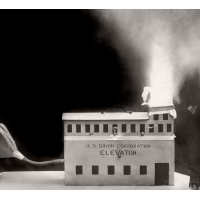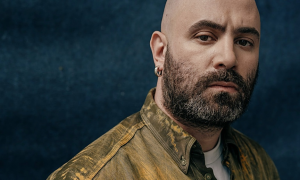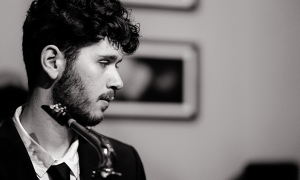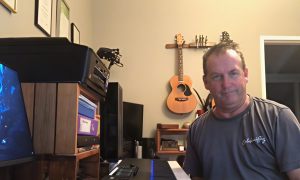Home » Jazz Articles » Take Five With... » Take Five With Greg Nathan
Take Five With Greg Nathan
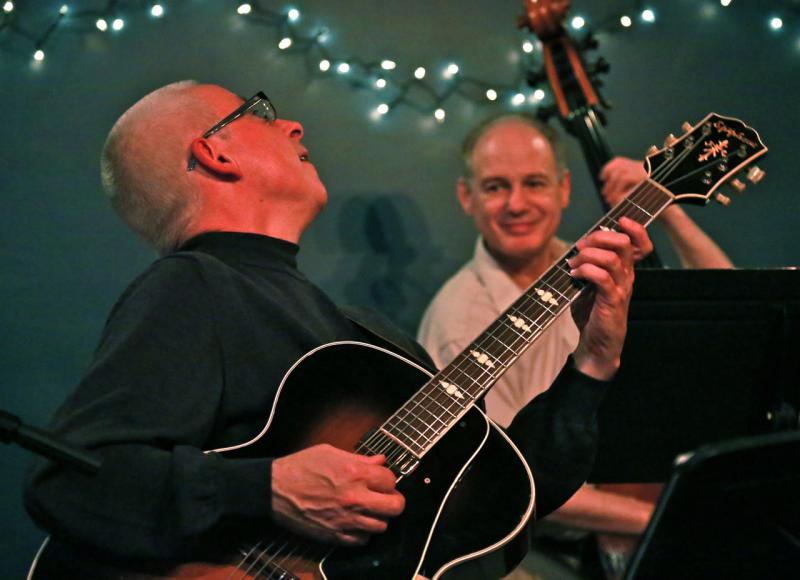
Greg Nathan began his professional bass-playing career in 1972 at the age of seventeen, performing popular jazz music with pianist Chuck Ruff and vocalist Donna Courtell. He completed his Bachelor of Music in Music Education degree at the University of Oregon in 1977. Greg earned a Master of Arts in Music degree at California State University, Sacramento in 1982. He is in his thirtieth season with the Eugene Symphony. His teacher is Larry Epstein, Assistant Principal of the San Francisco Symphony.
Greg is an accomplished composer of songs and serious music. He sings, plays, and uses the bow during popular jazz music performances. Greg is the leader of the jazz duo "Aftermath," joined by world-class jazz guitarist Mike Denny. Aftermath performances occur at Eugene's Hilton Hotel. Greg has performed with Nancy King, the late Charles Dowd, Paul Biondi, Tom Shove, Bill Sabol, Vikki Brabham, Gus Russell, Alan Tarpinnian, Jessie Marquez, and others.
After retiring from fifteen years of full-time classroom teaching in the public schools, Greg has recently become active in financial services, having earned his license to sell life insurance and securities. He is currently endeavoring to build a financial service business while continuing his music and education interests.
Greg has hopes of returning to teaching should the right opportunity present itself. Greg is also a caring husband, father, and active member of his church.
Instrument(s):
Double Bass, Voice, Piano
Teachers and/or influences?
At the age of about six, my dad, Chuck, gave me trumpet lessons. I learned to play a Bb major scale. I can remember bringing a trumpet mouthpiece to school and using it to entertain my friends. When one of them informed the teacher what I was doing, she had me perform for the class. I'm sure my lipping a Harry James solo Chuck used to play, using just a mouthpiece, probably didn't sound so great, but the kids loved it!
The point is, Chuck was my teacher from the beginning. I went nearly nowhere with the trumpet, but what Chuck, well over a decade later, taught me at the piano, became the object of much attention from me throughout the rest of my life.
To know who the greatest musical influences were on me, I just might as well tell you about who Chuck's greatest musical influences were, instead of my own, because Chuck has been the biggest musical influence on me.
For the most part, I agreed with Chuck's tastes in jazz, especially when it came to the supremacy of Art Tatum at the piano. He favored Coleman Hawkins on tenor sax, and although I love Coleman, I claim Ben Webster as my favorite jazz, tenor-saxophonist.
I knew I wanted to be a musician when...
One day, early in my life, Chuck pointed out to me the miracle of the inner ear. He shared with me his marvel at how anytime a person wanted to listen to their favorite music in their head, they could do so. He had me close my eyes and try to hear some music in my head. I found that I had the ability to do what he said, and I too was amazed that's how people are.
As an Oregon, high school wrestling-club member, coming home from Mexico City, in the middle of the summer, on a bus with no air conditioning and many mechanical problems that lengthened our journey, Chuck's lesson on listening to music in your head came in very valuable. I tolerated the very uncomfortable bus ride home playing my favorite jazz music in my head.
I would lie, as if asleep, on one of the bench seats of the bus, 18 hours a day, day after day, hearing a few familiar tracks in my head over and over again. The two I remember listening the most to were Lionel Hampton's "Stardust" jam session with the opening solo by Willie Smith, followed by Charlie Shavers on trumpet, later a Slam Stewart solo, and then even later Lionel's three choruses that break into quadruple-time. That cut is one of our family's favorites.
The other was, (ironically, and unintentionally,) "Sleepy Time Down South," featuring Bobby Pratt on trumpet with the Ted Heath big band. I couldn't wait to get home, put on headphones, and hear the brass of that band blaring in my ears. Having had enough of wrestling for the time, it was then that I knew I really loved music and wanted to pursue it.
Your sound and approach to music:
I'd love to give a short answer here, but there's no way. There's too may roles I undertake as a musician to start talking about my "sound." So, even though everyone has a "sound" let's just skip it and talk about "how" and "what" I play since regardless of the sound, it is the expression, and the content of the sound that is important to me. I realize that separates me from a lot of music lovers right there, but there's not right or wrong when it comes to taste in music, and so be it. All tastes in music are to be respected.
Instrumental jazz compositions can be interesting, but I prefer improvisation on melodies that have words. I think the potential to say something significant, meaningful, and substantial exists when one applies their musical ability to the spontaneous re-composition of a well-written, popular song. I like a music-listening experience where one can easily understand the musical ideas being performed, so as a jazz musician my goal is to play for others what I like to listen to myself.
I want to be able to connect with the lay listener. I want the music simple enough for anyone to understand. I want to share how I feel about a tune I have in common with a person I don't even know. My chances of doing that are pretty good if I draw on material that has already been popularized.
Tatum dazzled the likes of Horowitz and Rubenstein who came to listen to him, and he played nothing but popular melodies, great tunes written by the best composers. He improvised with a matchless technique, yet never lost sight of the melody. I think Tatum is one of the greatest musical minds the world has ever known, and I say this well aware of the vast body of fine-arts music written by the great composers.
Your teaching approach:
Although, by far, the majority of my working career has been spent as a licensed teacher employed with the public schools, only a small part of that time has been related to teaching music. I had some private bass students early in my career, but that was long before I found answers to all of the questions I had on how to play the bass. I'd love to share the school of playing I eventually learned from my teacher with students interested in it, and have often thought about how I might be able to do that.
With the concerned CD now out, my compulsion to teach the bass is not as intense as it was. I think the recording, of me and Mike, has accomplished a lot with regards to my sharing anything of worth I have to offer.
Since bringing forward my first CD recording, I'm rethinking what it is that I might do to support my family in a way that serves our community the best. Whatever I do will be in addition to my continuing on with the Eugene Symphony as a section bassist. Since I returned to Eugene in 1987, I've always managed my employment so that I could include my chores for the ESO. I'm not expecting that to change.
Your dream band:
I used to think I'd work with Oscar Peterson. I'm sorry now, since his passing on, that is not a possibility. I've always worked with the best jazz players where I live, so is it any surprise I'd like to work with the world's best performers?
It is always such a great compliment to get a call to work. It means you're wanted, and there's good feelings that come from understanding that. I'd do whatever I can to accomplish the gig for a name performer. I think everyone would be pleased if I were to start being used by the industry's tops. I know I have all it takes and more to be used that way.
Road story: Your best or worst experience:
I remember an audition in Reno in the late 70's for a show at a casino. I got the call through the Reno, AF of M Union. It was a high level gig. Essentially, show up for the audition for the gig that evening, after one brief rehearsal earlier in the afternoon. The pianist and I were fine, but the drummer showed up drunk. It did not go well, and yes, we did not get the job.
Recently, I got the call for a Pop's concert with the ESO, featuring Pink Martini. At intermission, I flew down to the break room set aside for the featured artists, and was there talking with the bassist, waiting to tell the lead singer I thought she sounded like Doris Day. I wanted to find out if anyone ever told her that before. I actually got a chance to ask her my question. She said people usually compare her to Judy Garland. I found out later that a jazz-trumpet playing friend with the symphony agreed with me, she sounded like Doris Day. Anyway, it wasn't very long after my brief exchange with Pink's lead singer that the personnel manager for the orchestra showed up to guide me out of the room, nicely informing me I wasn't supposed to be there. I was apologetic and embarrassed. I suppose my having just released my first CD was cause for me to be a little overly enthusiastic for being one of those who are in the public eye. Oh well, it makes a pretty good story.
Favorite venue:
Eugene's Adam's Place. Mike and I used to play there a lot when it first opened, and less after it was up and running. I think Mike and I did a lot to help Adam's Place get rolling. Unfortunately, after an expansion to add an adjacent club "Luna," the community support for the restaurant/club tailed off, and it closed.
While in the middle of its stretch of operations, I approached Adam's Place as my first choice for the location and appearance of "Aftermath," but Adam felt it was not the right type of event for his club. Aftermath wound up at the Hilton of Eugene.
Your favorite recording in your discography and why?
I have just the one: "I'll Think of Something." It is my favorite!
Really, I have thought about doing my first recording the whole time. Remember, I grew up with a dad who was actively recording the songs he wrote. So what -such a son who is musical is not going to be thinking about doing a recording of his own?
I'm not the type of musician who was capable of coming together with a marketable product at a young age. Coming from a family where the standards for music were very high, it has taken me this long to come forward with something I am comfortable with releasing. The concerned CD is my life's work.
Besides my continual growth right on up to, and through the recording of the concerned CD, I never knew what the content of my first recording might be. There are so many facets to my musical activities it could have been anything from fine arts music for the solo double bass, some fine arts music that I composed, to something with me playing the jazz piano, (although in the early 90's, when Mike came back from NYC to Eugene, I realized my public performances at the piano were perhaps confusing the public, and that I ought to just focus on the bass. I'm strictly a jazz pianist, and it is not my first instrument. I'm sloppy, and really pretty awful compared to someone who is a fine pianist, but many people like hearing my jazz piano playing) Anyway, when and where I might turn up on another recording, doing whatever, is unknown at this time, but I'd love for my discography as a bassist to lengthen in a dramatic way.
The first Jazz album I bought was:
One day as a teenager, I took a walk in our neighborhood, and wound up at the local music store. They had a small selection of LP's in a basket that I went through. I wound up buying the Nat King Cole Trio's "Easy Listening Favorites." Nat sings every other song, trading off with instrumental renditions from his trio, on that album. After I played my new possession in our living room at home, the response from my mom and dad was very encouraging. They loved it quite a bit, and so did I. My dad pointed out Nat's unique touch at the piano, which became an influence on me later as I began to study jazz piano. There were many elements of music present on that album that inspired me and influenced my jazz, musical development as time went forward from there. A track or two from Nat King Cole's "Easy Listening Favorites" was recently played as prelude music to my mom's funeral service.
What do you think is the most important thing you are contributing musically?
From the beginning, I've always been able to offer up a good swing feel. Today, I still have that, along with all that is evident on the CD and more. I'm an expressive classical soloist, having performed many times in church, and people have told me they enjoy my excursions into avant-garde music, when I've gone there.
Did you know...
Like Ray Brown, I enjoy trying to play golf. I've been careful, on purpose, with my wording here! Golf is a skill I have not yet mastered, but it is fun to try to be good at that game.
Actually, I have not hit a ball in the last couple of years, but I think about it. It is a running joke in the Nathan household for me to make the announcement, "I think I've figured out my golf swing!" I've announced that a thousand times. I actually announced that just the other day. The really funny part is, I'm serious!
CDs you are listening to now:
I always mark my part while listening to the ESO program for the upcoming concert. Most of the time I can accomplish that for free, taking advantage of the videos on YouTube. Previously, I could purchase audio downloads, to accomplish the same thing. Before that I would have to deal with LP's.
In my car, as I drive, most of the time, I'm listening to the "I'll Think of Something" CD with me and Mike on it. There's two reasons that I have identified for this. One reason is that I feel the need to keep checking it out, to make sure it is as good as it needs to be for me to promote it. The other reason is that I really like it. Good, bad, or indifferent, we recorded a bunch of music that combines many musical elements that really appeal to me, so I'm listening to it most of the time. The good news for me is I haven't worn it out. Perhaps it is just me, but our CD seems to possess that quality, and I think that identification is exciting.
When my daughter and I go for a ride, she puts in John Pizzarelli's, "Here Comes the Sun." We really enjoy the rhythm and sax work on that track. She also likes Diana Krall's "Let's Face the Music and Dance." That one has such a nice feel. My son likes the Oscar Peterson/Ben Webster CD. No specific track on that one. We just enjoy the quartet working together.
Recently, if I need to relax, I listen to some old Sinatra tracks, to hear the Boss exercising his craft. Anything from the Sinatra/Jobim album is always very nice, but I noticed the other day his track of "My One and Only Love" off the "This is Sinatra" album, and realized it is probably one of his best.
Desert Island picks:
1. Art Tatum / Ben Webster, Group Master Pieces (Pablo)
2. Lionel Hampton, Stardust (Decca)
3. Sinatra / Basie, An Historic Musical First (Reprise)
4. Ella Fitzgerald, Ella in Hollywood (Verve)
5. Buck Clayton, All the Cats Join In (Columbia)
How would you describe the state of jazz today?
My Dad's musical, "Where the Heck's the Plot" was inspired by "Mr. Saturday Night's" scene where Billy Crystal starts his rant on "Where's the writer's?" and goes on, and on, and on... Well, I'm going to borrow another line from that movie in response to this question: "Don't get me started!"
The music market today is full of markets with sub markets. It is not like it used to be. Consumers are purchasing music from a huge selection of styles. The good news is my market, jazz pop, is one of those markets, so how much can I complain?
Buble, Krall, and even Rod Stewart, have made good money in this day and age, selling jazz-pop CD's. That doesn't mean what they are doing has great musical worth, but its nice to know you can still sell well-written songs. With all the covers being part of "I'll Think of Something's" program, we are hoping we can capture some part of that market.
I worry a bit that the jazz that was America's, during the swing era, will be lost. However, my dad, when he was interview by the local TV station, on the day Sinatra died, told the reporters he thought, swing music had too much going for it to ever totally disappear. I try to remind myself that those were his feelings from time to time.
Of course the jazz that is going on that is not jazz-pop interests me less, but I'm happy that there's energy for production in those genres. There's no saying what style of music might come forward with something that is good and entertaining, worth experiencing. If it is that, I surly want to come in contact with it.
What are some of the essential requirements to keep jazz alive and growing?
I'm glad that you are asking this question. My dad used to say that every dollar spent in consuming music, in any form, is a vote. That being said, in order for jazz to be healthy, people need to be voting for it with their dollars.
Soaring Music Publications is thrilled that we have something new on the market that people can vote for. We surely hope that jazz lovers support our CD by purchasing it, and in return look for, and see, the health of the jazz market in the music industry on the rise.
Chuck's "Where the Heck's the Plot" is a fascinating comment on musical writing. If "I'll Think of Something" were to catch on, where Soaring suddenly earned sufficient resources to produce this musical as a movie, some good new songs would be available for jazz renditions.
What I'm saying is what I know my dad believed, more than anything, today's music market needs more, good, new songs. Regretfully, I don't think there have been very many good new songs written since the late sixties. Jazz pop performers have had to rely on songs written from before that time for their recent recordings.
Is there anybody out there wanting to grab their ax and wail out several chorus of anything popular that has been recently written? It's not funny, but rather sad, if you think about it, because popular, honored, award-wining songs used to lend themselves nicely to jazz renditions. "Over the Rainbow," "The Days of Wine and Roses," and "The Shadow of Your Smile" were all academy-award-winning songs. Over the last several decades, by far the majority of popular songs that have been honored and awarded are not the ones jazz musicians are selecting as subjects for their improvisation, and I think that is unfortunate. Sadly, that's just the way music in our culture has become.
There is a song from "Where the Heck's the Plot" entitled, "What Happened to the Writers?" I hope that someday you see and hear that song as part of a performance of the musical it is from. When considering today's popular, honored, and award-winning songs, compared to the songs that used to be popular, honored, and awarded, the musical question my dad asks is quite understandable.
What is in the near future?
Hopefully, soon, we will benefit from some kind of a break. Hopefully, soon, we will catch on somewhere. To make it happen, I keep exploring, finding opportunities, identifying and locating influential people that might be able to open some doors, sending out promo copies to them and then following up. If nothing else, maybe someone decides they want to record one of our originals, or use me as a bassist on one of their recordings. Perhaps an offer from a label.
We envision a website beyond what we currently have at CD Baby, where we can post historic and newly created videos, and we want to get some videos posted on YouTube. It's a lot of work and it costs money.
Soaring is committed to continue on, making an effort to bring our CD to those who can enjoy it. We have a great story in our CD to share, and consider it a service every time we deliver a CD. Even though we separate the consumer from the cost of ownership, we know they are the winner. The value of our product is real. In time, it may be that we need to solicit funding for promotion purposes, issuing shares in return, but we haven't come to that point yet.
What's your greatest fear when you perform?
Generally, fear when I perform is not much of a factor. I crave the spotlight, and have a history of coming through under pressure. I worry sometimes that I am too pumped up to execute at my best. I suppose, if you need a problem in the area of fear, that one is a pretty good one to have.
What song would you like played at your funeral?
I'm not saying that this is how it will be, but at this time, my suggestion would be to hire a bassist and pianist to perform, as special music, the Bottesini "Elegy." It would be nice if it were the orchestral-tuning version from the Oscar Zimmerman collection, (number 8,) and used my bowings, and phrasing. Preparing the will for my wife and me is something that is on my list of things to do for the summer. While I'm at it, I suppose I ought to leave a marked copy of concerned piece I want the funeral musicians to use.
What is your favorite song to whistle or sing in the shower?
I try not to do that, but if for some reason I break into something while showering, it is going to be different every time. Probably just something I'm working on, or something that is stuck in my head, not a favorite.
By Day:
I'm still working in the public schools, but now as a substitute instead of a classroom teacher. I'm in the process of studying for a Math exam that will allow me to teach middle-school Math.
I have noticed that activity in Math enhances my musical performance. I believe in Math for students. I've always enjoyed teaching Math, and my students have had good feelings about me being their Math teacher.
Hopefully this works out for us. The good news is, there's a need for middle-school Math teachers where we live. I have established myself as an excellent classroom manager, so we are hopeful.
If I weren't a jazz musician, I would be a:
Being a jazz musician is just one of the things I am. Perhaps more than your average guy, I do many things. If I were not a jazz musician, I would have enough other things that I do that I might not miss being a jazz musician so much. That's just the way I am. I have a lot of interests.
As I get older, I'm still taking on new ones, and that's not good, because eventually we all will hit a certain age where we are only able to do less and less. Sometime soon, I am going to have to start limiting the things I do. I expect being a jazz musician will be one of the last things I let go of, at which point I can see myself confined to a bed listening to some music I'm interested in hearing.
We can always be interested in many things, but what we actively do has to decline, until finally we are doing nothing, and we die. If we have helped others with a good portion of our time, in this mortality, then it will be well with us in the life to come.
Tags
PREVIOUS / NEXT
Support All About Jazz
 All About Jazz has been a pillar of jazz since 1995, championing it as an art form and, more importantly, supporting the musicians who make it. Our enduring commitment has made "AAJ" one of the most culturally important websites of its kind, read by hundreds of thousands of fans, musicians and industry figures every month.
All About Jazz has been a pillar of jazz since 1995, championing it as an art form and, more importantly, supporting the musicians who make it. Our enduring commitment has made "AAJ" one of the most culturally important websites of its kind, read by hundreds of thousands of fans, musicians and industry figures every month.









